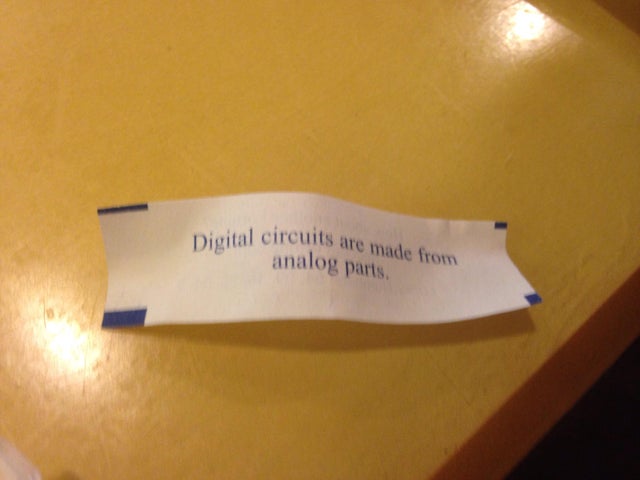If, simply put, digital is defined as anything we can count (with digits, or say, up to ten digits per etymological analysis), I would assume that anything that we can't and it's analog, but if so, why "analog" and not just "non-digital"?
-
1$\begingroup$ Did you notice that's not "can…" but "choose to…" count? The more so since you introduce 10 digits… Isn't the problem assuming anything about your kind of counting, when in fact the Question is whether "digital 50/50" is "analogue grey"? $\endgroup$– Robbie GoodwinCommented Mar 20, 2022 at 19:23
7 Answers
Please see this answer in the english stackexchange site on the origins of "analog", where it is discussed how the term specific to electronics came to use in the 40's with the emergence of digital computing (and in contrast analog computers before that).
However I don't find the definition "anything we can count" as simple or clear, as I would not necessarily associate anything meeting that description as being "digital" (I can count my siblings and yes they have fingers but I still don't call them digital).
With reference to signal processing (the topic of this forum), I like the definition "digital is any signal that is discrete in time and discrete in magnitude", which Marcus Mueller had pointed out here is the definition provided by Oppenheim and Shaeffer with no other caveats. I find it to be both concise and complete. Digital electronics work with signals and data that meet this definition. If we want to concern ourselves only with what can be plausibly implemented in computers and hardware, we can then add the caveat that it also must be a finite number of elements as @AlexTP proposed in the comments to this related post. (However we often work with abstractions that go to infinity, so this shouldn't exclude a waveform from being "digital" IMO. (I can certainly picture cases of waveforms that extend for infinite time, but must admit that I can't yet conceive of a practical application, meaning mathematical convenience, of extending a digital waveform to infinite magnitude).
I appreciate this digital data definition:
information represented as a string of discrete symbols each of which can take on one of only a finite number of values from some alphabet
Although I am ok with the 'finiteness', it could be indefinite, as the number of symbols might be "as large as necessary".
Everything is not either digital or analog. Some systems are both, and often called hybrid: digital/analog computers, analog/digital filter banks for rate conversion. The analog part is often fast and little power consuming, the digital part bringing precision and accuracy.
-
6$\begingroup$ Where can I buy such fortune cookies? $\endgroup$– JohnEyeCommented Mar 21, 2022 at 15:04
-
3$\begingroup$ For all we know, the converse might also be true. $\endgroup$ Commented Mar 21, 2022 at 19:03
-
1$\begingroup$ @OverLordGoldDragon Yes! I suspect some definitions of "digital" might describe how quantum energy levels work. :-) $\endgroup$– Peter K. ♦Commented Mar 21, 2022 at 19:51
-
-
1$\begingroup$ @freesoftwareistheway, "Digital circuits" are circuits that deal with signals that represent a discrete number of possible instantaneous values. (Usually just two values, known as "0" and "1", or "true" and "false".) All modern digital circuits are based on transistors as switching elements, and many older digital circuits were based on vacuum tubes. Most of those same transistors and tubes behave in ways that would also make them useful for processing analog signals. $\endgroup$ Commented Mar 22, 2022 at 20:51
While still mostly theoretical, "quantum" can be considered as a third option. A practical definition of these could be "analog superpositions of digital signals", but they're not hybrid systems in the sense of Laurent Duval's answer. A hybrid system has analog parts and digital parts. In a quantum processing system, the processing happens in quantum gates which can't be analyzed as purely digital or purely analog gates.
IMHO, the best answer to your questions about digitalness is this article Humpty Dumpty's Philosophy of Language, specifically the conclusion paragraph.
Analog systems rely on physics that tends to have «events» or discrete-like phenomena.
Digital systems rely on physics that have very analog bandwidths and finite rise times and tolerances.
Thus I vote that the essential differentiation lies in how it is convenient for us to analyze said systems. For a simple LRC filter of some size, it is usually not needed to think of single electrons, it is more convenient to analyze as a continuous system. For a ARM core, it makes sense to think of the multiply as a digital operation and not consider the rise time of the voltages going on under the hood.
Somewhat similarly, one might wonder if there truely are «stochastic» systems out there. (I believe that the physicists say «yes»). In many cases the system may well be deterministic, but it makes sense to analyze it as stochastic?
There are also versions that don't follow our present fashion. A form of digital design is asynchronous digital design; which has the potential to be of much higher performance (never realized as far as I know).
Then there is the true "hybrid"; simultaneous PWM and frequency modulation.
This is, apparently, how animal/human nervous systems "compute" (unless you are willing to say we are incapable of it).
And last, there are the "AI"/ML systems that accept patterns by weights of prior training; which I wouldn't count as "digital" even though the elements are, usually, are the same as traditional digital electronics.

